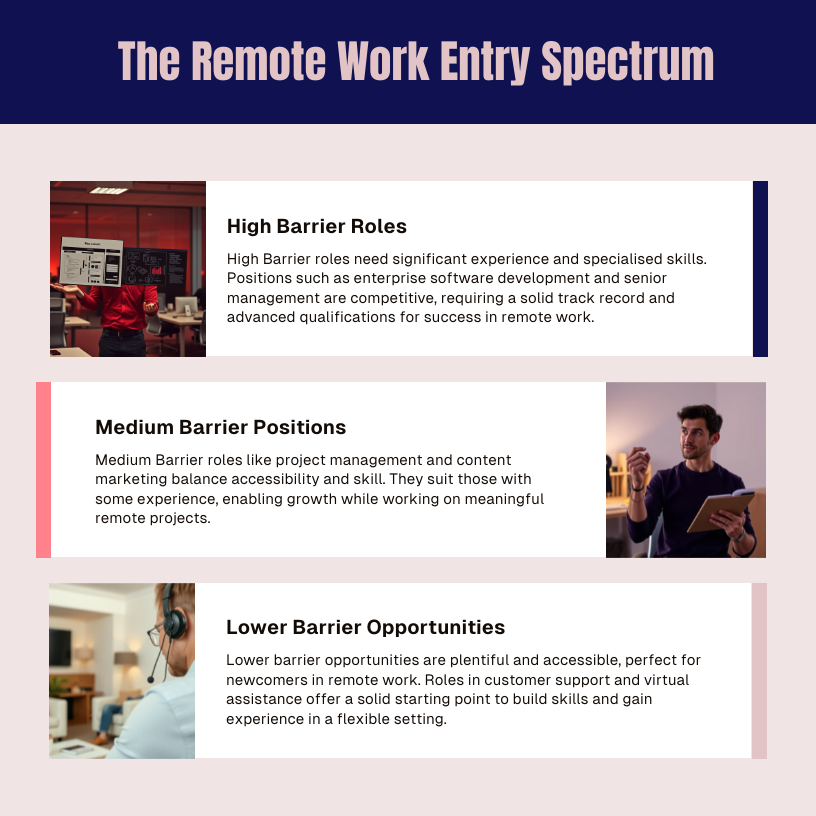ALorem ipsum dolor sit amet, consectetur adipiscing elit. Maecenas eu porta tellus. Mauris sit amet efficitur velit, vitae mollis ipsum. Cras a facilisis sem, vulputate accumsan diam. Praesent molestie, mauris nec dictum condimentum, sem metus lobortis orci, vitae auctor nunc ante et nunc. Phasellus dui ligula, hendrerit eget urna sed, porttitor sagittis libero. Nam tempor felis quis erat imperdiet pulvinar. Aenean euismod vitae nibh eu pretium. Cras quis elementum risus, nec ultrices felis. Nulla aliquet elementum erat et finibus. Quisque aliquam quam ultrices nibh congue sollicitudin
The world of remote work can seem like an exclusive club—one that requires an invitation in the form of years of experience. You scroll through job listings, each demanding "minimum 3-5 years of remote experience," creating what feels like an impossible paradox: you need remote experience to get remote experience.
Yet beneath this apparent barrier lies a more encouraging truth. The remote work landscape is constantly evolving, creating unprecedented entry points for those without traditional experience. The key is knowing where to look and how to position yourself effectively.
The greatest misconception about remote work isn't that it requires experience—it's that it requires the same type of experience as traditional employment.
Remote work isn't a monolithic entity but rather a diverse ecosystem with varying barriers to entry. Some sectors of the remote economy are highly competitive, while others remain relatively accessible to newcomers.

High Barrier:
Medium Barrier:
Lower Barrier:
Understanding this spectrum allows you to target opportunities strategically, focusing on sectors where the experience requirements are less rigid while still aligning with your long-term career goals.
Customer support has emerged as one of the most accessible gateways to remote work, with companies increasingly prioritising conversational skills and problem-solving ability over prior remote experience.
Why it's accessible:
How to position yourself:
Growth trajectory: Starting in customer support can lead to specialised roles in quality assurance, team leadership, product operations, or customer success management. Many remote professionals who began in support positions have transitioned to product, operations, or marketing roles within 1-2 years.
For guidance on highlighting transferable skills from non-remote roles, our article on [Creating a CV Without Traditional Experience] provides valuable frameworks for showcasing relevant capabilities.
The explosive growth of digital content has created substantial demand for creators, editors, and managers who can produce quality material consistently, often with more emphasis on portfolio quality than formal experience.
Why it's accessible:
How to position yourself:
Growth trajectory: Entry-level content positions can evolve into specialised roles in SEO content strategy, email marketing, social media management, or content team leadership. The content creation space offers particularly fluid career progression based on demonstrated results rather than tenure.
Administrative support in remote contexts has expanded beyond traditional secretarial work to include project coordination, basic financial management, scheduling, research, and communications management.
Why it's accessible:
How to position yourself:
Growth trajectory:Virtual administrative roles can develop into positions in operations management, project coordination, team leadership, or executive assistance. The broad exposure to business functions makes this an excellent launchpad for identifying specialised career directions.
As online communities become central to business strategy, the need for skilled moderators and managers has created a relatively accessible entry point that emphasises interpersonal skills over technical expertise.
Why it's accessible:
How to position yourself:
Growth trajectory: Community management can evolve into roles in customer success, product marketing, partnership development, or dedicated community strategy. The relationship-building skills developed in these positions transfer effectively to numerous business functions.
Many who struggle with confidence when entering new professional territories experience imposter syndrome. Our guide on Why Imposter Syndrome Happens and How to Overcome It offers practical strategies for building authentic confidence in new roles.
Forward-thinking organisations have developed structured remote internship and apprenticeship programmes specifically designed for those without prior experience, offering a supportive environment to develop remote work capabilities.
Why it's accessible:
How to position yourself:
Growth trajectory:Remote internships frequently lead to junior full-time positions, with many organisations using these programmes specifically as talent pipelines. The structured nature of these opportunities makes them particularly valuable for developing core remote work habits.
Beyond targeting specific entry points, certain strategic approaches can significantly increase your chances of securing remote opportunities without prior experience.
Rather than relying solely on your CV, develop tangible work samples that demonstrate your capabilities directly. For remote positions, seeing evidence of what you can produce often outweighs formal credentials.
Action steps:
While generalised certifications rarely compensate for experience, targeted credentials in remote-specific tools and methodologies can signal readiness for distributed work.
Action steps:
For a comprehensive view of capabilities valued in distributed work, our article on High-Value Skills for Remote Work in 2025 can help you identify the most strategic areas for skill development.
Rather than aiming directly for fully remote positions, target hybrid roles that combine in-person and remote work as a transitional step.
Action steps:
Identify roles that, while not themselves remote, interact frequently with remote teams or support remote operations.
Action steps:
While long-term gig work may not align with everyone's career goals, strategic use of freelance platforms can build both experience and portfolio materials.
Action steps:
Many professionals face periods of trial and error when transitioning to remote work. Be mindful of potential burnout during this process by reviewing our guide on 5 Signs You're Experiencing Burnout to maintain wellbeing during the transition.
Understanding and proactively addressing the concerns employers have about hiring inexperienced remote workers can significantly strengthen your candidacy.
Employers worry that inexperienced remote workers may struggle with digital communication nuances.
How to address it:
Employers may question whether someone without remote experience can maintain productivity without direct supervision.
How to address it:
Concerns about technical preparedness for remote collaboration can be a significant barrier.
How to address it:
Employers may worry about integrating inexperienced remote workers into established team cultures.
How to address it:
Beyond specific strategies and entry points, developing a remote-ready mindset positions you for success in distributed work environments.
Key mindset elements:
This mindset can be demonstrated throughout your application process, from the clarity of your cover letter to your responsiveness during interview scheduling.
The journey into remote work without experience requires patience and strategic persistence. Many of today's remote work leaders began without any distributed work experience, leveraging entry points similar to those described above.
Remember that remote work capabilities develop through deliberate practice rather than osmosis. By consciously building relevant skills, seeking appropriate entry opportunities, and demonstrating a remote-ready mindset, you can overcome the experience paradox and establish yourself in the remote workforce.
At WCFC Academy, we've helped professionals navigate the transition to remote work, even without traditional experience. Through our frameworks and personalised guidance, we provide the structure and support needed to identify your most promising remote work entry points.
Ready to begin your remote work journey? Take the first step today with our free Gallup StrengthsFinder Assessment. Understanding your innate strengths helps identify the remote work pathways most aligned with your natural capabilities. Discover your remote potential and take the first step toward location independence.
“Raesent molestie, mauris nec dictum condimentum, sem metus lobortis orci, vitae auctor nunc ante et nunc ligula”



Your potential is infinite. Our mission is to activate and unleash it in the right environment.